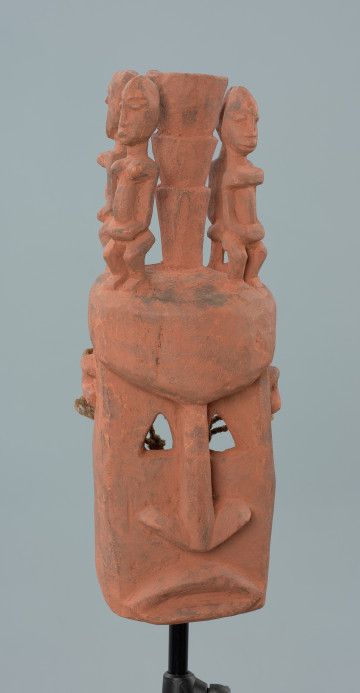
Sirige mask
między 1951 — 1998
National Museum in Szczecin
Part of the collection: Collection of Dogonian art
The sirige mask, in the Sigi-so Language awa danu, meaning mask of wood, represents the house of the head of a large family. A façade characterises the building with many tiny niches and a terrace from which one enters, among other things, the rooms with the altars of the family's ancestors.The myth explaining the creation of the sirige mask tells the story of young Youga boys that once herded goats at the edge of the bush. One of them noticed Andumbulu - a mythical, low-growing creature with a long object on its head. The strange ornament was painted in red and black patterns. The boy called out to his companion to share his discovery, but his shout made everything disappear. All they found on the spot was a long wooden object. They wanted to take the find with them, but it turned out to be broken, so they only took a fragment. At home, they told their old father everything and drew on the rock what Andumbulu had abandoned. After seeing the drawing, the father went to the bush, cut down a tall tree, worked it, and painted it in the patterns from the drawing. It was sirige's first mask.According to one informant, Marcel Griaule, a young shepherd from Youga instead of Andumbulu, saw in the bush the deity Sintandu, who looks like a man, has two arms and two legs (other deities living in the bush usually have only one lower and upper limb each), is as tall as a pole and covered with line drawings. Sintandu is an evil deity who hurts people, and the evidence of his presence is the wind blowing hard.The sirige mask is used by male members of the Awa society.
Ewa Prądzyńska
Author / creator
Dimensions
cały obiekt: height: 410 cm, width: 18 cm
Object type
sculpture, mask
Creation time / dating
Creation / finding place
Identification number
Location / status

między 1951 — 1998
National Museum in Szczecin

między 1951 — 2000
National Museum in Szczecin

między 1965 — 1970
National Museum in Szczecin
DISCOVER this TOPIC
Castle Museum in Łańcut
DISCOVER this PATH
Educational path